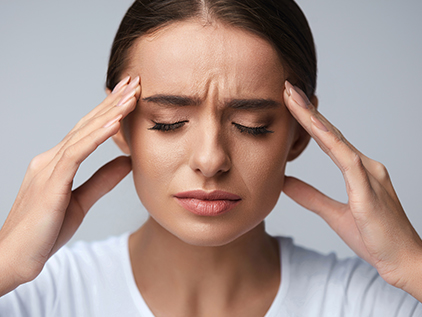Botox® Stopped Her Chronic Migraines


Ask any teenager. High school is tough.
Classes, homework, sports, clubs, hanging out with friends. Full schedules can leave the typical teen exhausted, even on a good day. Imagine handling the pressures of high school – let alone having any fun – while battling relentless migraine headaches.
That's exactly where Paige O'Leary of Kansas City found herself 5 years ago. A bright student and talented athlete, Paige entered the A+ Schools Program and played for the volleyball and golf teams. But when the headaches hit, it became impossible to keep up.
Her quest for relief began.
"First, I went to my primary care doctor, and they prescribed medications for anxiety and high blood pressure," says Paige. She found no respite from the intense pain she experienced at least weekly, and often daily. She continued her search for answers.
"The dentist gave me a mouth guard in case I was grinding my teeth at night," she says. "I saw the optometrist for a full eye exam, but it showed nothing."
A chiropractor treated her for neck misalignment, including a nerve block treatment. The block helped for a little over a month, but the migraines returned. Soon Paige was taking a dozen medications every day and struggling with the draining side effects.
"She missed more than 30 days of school," says Kim O'Leary, Paige's mom. "The doctor had to write a note to the school explaining her absences. In the A+ program, you had to keep a 98% attendance, and she was nowhere close."
Paige tried everything. Exercises for her posture. Urine and blood tests for food allergies. Acupuncture beads in her hands and ears. Trigger point injections in her back and shoulders.
Desperate to find a long-term solution, Kim arranged a visit to the Mayo Clinic. Paige saw exercise therapists, the sleep disorder team, a psychologist and a neurologist who suggested a treatment involving steroid shots in the back of the head. After treatment, Paige found herself pain-free almost immediately and stayed that way for nearly 10 months. But sadly, the break didn't last.

Migraine plagues more than 12% of the US population. Learn more about distinguishing migraine headaches from other headaches, how behavior changes may reduce their occurrence and treatment options, including BOTOX®, that can provide relief.
"Paige was about to leave for her first year of college," says Kim. "We couldn't send her off knowing she would be incapacitated by these headaches like she was in high school."
Kim had heard about Botox injections as a new approach to managing chronic migraines. She and Paige were referred to neurologist Deetra Ford, MD, at The University of Kansas Health System.
"Botox has been FDA-approved for awhile, becoming a common treatment for chronic migraines as more neurologists become trained to administer it," says Dr. Ford. "The criteria for a patient to receive Botox is 15 days or more of migraines per month, with each migraine lasting more than 4 hours. Botox is not always a last resort, but we see most patients after they've tried preventive drugs without success."
Every 3 months, Paige visits Dr. Ford to receive her Botox treatment. The procedure, which involves a number of small injections throughout the head and shoulder area, has reduced the intensity of her migraines and lessened the frequency to just once a month, a dramatic improvement compared to multiple days every week. And she can't say enough about the care she's received.
"Dr. Ford's technique minimizes any discomfort, bruising or side effects from the injections," says Paige. "The Botox really helps."
Dr. Ford appreciates patients embracing the combination of treatments they feel is right for them.
"I always talk to patients about their individual treatment plan," she says. "If we can reduce a patient's migraine frequency by at least 50%, lessen the intensity and reduce the number of medications needed, that's success. For some, Botox has helped break the headache cycle. For many, the best course includes a combination of Botox and medication."
If we can reduce a patient's migraine frequency by at least 50%, lessen the intensity and reduce the number of medications needed, that's success. – Deetra Ford, MD
Neurologist
"Our goal for Paige, and others like her, is restoring as much functionality as possible, so she's not missing out on daily activities, such as school, work and time with family and friends," says Dr. Ford.
Now a college sophomore pursuing a degree in pediatric nursing, Paige enjoys all those things and more – without pain or medication.
"It's no fun going through the battle of finding the right treatment," Paige says. "But if you think Botox might be a good option for you, I say go for it. In high school, I'd just stay home because of the pain. Now going to class, hanging out with friends, just being pain-free and med-free, it's an amazing feeling."